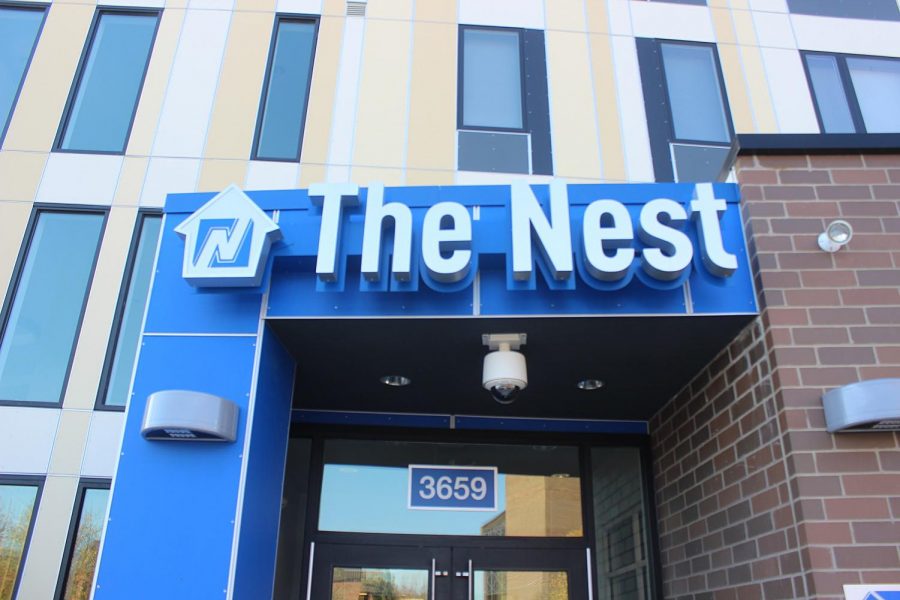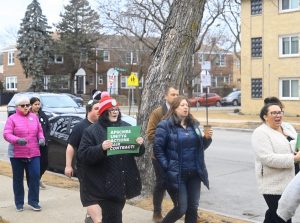NEIU pays The Nest $600,000 due to low occupancy
December 2, 2018
NEIU President Gloria J. Gibson informed the NEIU community that the university paid The Nest more than $600,000 in October to make up the gap of low occupancy during her first State of the University Address on Nov. 27.
In an interview with Vice President for Student Affairs Dr. Daniel Lopez Jr. and Director of Strategic Communications Mike Hines on Nov. 29, Lopez explained that the contract NEIU has with American Campus Communities (ACC) requires an 80 percent occupancy in The Nest.
“This last year our occupancy was 53 percent,” Lopez said. “Because we did not make our 80 percent requirement, we are expected to make a financial contribution to make that gap from 53 percent to 80 percent.”
Lopez said the university needed to pay the 27 percent difference by the end of October, which was “just over $600,000.”
“Given our predictions for next spring, we think it’s going to be a very similar amount and we will have to make a contribution by February,” Lopez said.
When asked if this contribution meant other programs and services would not be funded or if people would be laid off, Lopez said, “Not due to this. As a matter of fact, the president has made it very clear that, even though she’s been here only for six months, that a lot of our departments are already operating at a very limited budget so we can’t afford to decrease resources for students. As a matter of fact, we need to increase some of those resources.”
Lopez said they would have preferred to invest that money elsewhere, but it is money that the university carved out of the general operating fund.
“We are not decreasing financial aid services because we’re paying this, no. It’s a commitment that the university made when we went into this agreement and we just have to find the money.
“I think the bottom line is that there will be less money put into the reserves,” Lopez said.
As for the plans to build another residence hall, Lopez said, “No. At this point, there are no plans for us to build an additional residence hall whether it’s in the newly acquired properties on Bryn Mawr or even on campus.”
Lopez said the process to apply and live at The Nest was more selective this year than before, which could’ve attributed to the low occupancy. Students interested in living at The Nest first had to meet with a financial adviser to determine if they can afford it with scholarships and loans.
“We did it this year because we knew that some students were wanting to live in The Nest who couldn’t afford to live in it and the university did not want to put any more additional financial burden on the student,” Lopez said.
Another reason that Lopez said he believed contributed to the low occupancy at The Nest is the new policies put into place to increase students’ safety. Based on incidents involving altercations and verbal threats to one’s safety, Lopez said the university decided to restrict the number of visitors in each room and making them sign in before going into the rooms. Visitors must leave their I.D.s in the front desk and they must leave at certain times.
“The issues came from visitors, not necessarily the students,” Lopez said.
As the new policies were implemented, Lopez said students were not happy with them. During a town hall meeting Lopez held with the students living at The Nest, Lopez said he asked them to form a club and then provide recommendations to The Nest management and to him on improving the policies.
“We’re waiting for them to have those conversations,” Lopez said.
According to Lopez, the occupancy requirement for the fourth year of the five-year contract with ACC is 80 percent again, then about 78 percent for the fifth year.
“The bottom line for us is really enrollment,” Lopez said.
Hines said that the percentage of decrease in freshmen enrollment was “in the 40s.” When looking at the Enrollment Fact Sheet for fall 2018, the number of freshmen students who enrolled at NEIU for the fall 2017 was 830 students. This fall, it was 451 students.
“We know that from year one and two (of the residence hall contract) that about 25 percent of the students who enrolled at the university also lived on campus,” Lopez said. “So if there is a dip on first-year enrollment then we’re certainly going to have a less occupance in the residence hall.”
Director of Undergraduate Admissions Lamont Vaughn said, “I think enrollment is low because we’ve seen enrollment go down across the state on average of five percent. It’s the trend. I think when the economy is good, sometimes students would go into jobs instead of education so there’s no one factor that points to low enrollment.”
What are some initiatives NEIU is creating to improve enrollment and retention at NEIU and The Nest?
One of the initiatives Lopez said NEIU is working on to increase occupancy is forming an agreement with community colleges to allow their international students to live in The Nest while studying at the other institutions.
Lopez said, “We were approached by Truman not long ago because they attract a lot of international students that are coming to learn English but they have difficulties finding housing, so they’ve asked us to consider going into some kind of understanding with them. That we would house (the international students) here while they are attending Truman. We’re working on that now for Truman and Wright College.”
Lopez said he hopes this agreement would be a “seamless transition” for international students to transfer to NEIU when they are done at the community college.
“This would give them an opportunity to see what Northeastern is all about,” Lopez said. “That’s a win-win I think. We know that there are other housing projects that do that and are quite successful.”
While Lopez said that one of the main priorities of Gibson is enrollment, he said retention is another priority.
“She just announced the revamping of the support programs under Dr. Frank Gaytan so I think that’s going to be very helpful in terms of us retaining students,” Lopez said. “It’s not just about bringing them in; it’s making sure that they are here and making reasonable progress towards graduation.”
Lopez mentioned the new Golden Opportunity scholarship for new students enrolling in fall 2019. He said the scholarship is a combination of state funds and NEIU is “matching those funds;” about $1.6 million will be dedicated for new students.
When asked if he’s thought about following Chicago State University’s footsteps and allow all domestic out-of-state students to pay in-state tuition, Lopez said, “NEIU has not considered this idea at the moment.”








Robert Kastigar • Nov 14, 2021 at 1:46 pm
What is NEIU currently (2021) paying to subsidize The Nest?
Robert Nishimoto • May 4, 2020 at 5:20 pm
I would appreciate it if moderators could add after the word property, “on Bryn Mawr”. Otherwise my comments are unclear. Thanks.
Robert Nishimoto • May 4, 2020 at 5:16 pm
It is good some people still remember the shame President Hahs brought to NEIU when she seized the property in the name of NEIU to build dorms there. There were people who worked there, there were people who lived there. I was looking forward to being an alumni. After the land grab, when I think of Northeastern all I feel is shame. The only way NEIU can redeem itself is to return the land to the people it was stolen from. Since this is not going to happen, I will always be disappointed in a place I once loved, and I have no school.
Jessica french • Oct 12, 2019 at 8:28 am
The nest sucks anyways so this was bound to happen. The staff changes every year and they get more and more rude. They don’t work with students that do live there and no wonder % is going down. Also, a lot of people who were kicked out of dorms left school all together because of distance, bill or lack of support from Nest AND aid office. It’s a circus show in The Nest.
Warren Olson • May 21, 2019 at 7:59 pm
It is amazing to me the lack of morality and ethics of the people that are put in place to govern Public Universities in this state. Apparently the former President Sharon Hahs has created a beast of her own delusional idiocy with the Nest. It is entertaining to watch the piece ‘Domain; the taking of Bryn Mawr Avenue’ and listen to her sanctimonious rant about urban blight in the neighborhood where the properties at the root of this struggle sat. Today, it is so much better because to me nothing says Urban Blight much better than empty unoccupied buildings with their windows painted over. Didn’t anybody tell her that NEIU has and probably will always be a commuter campus. She obviously watched Field of Dreams one too many times. Now, the University is beset with economic issues because of this foolish decision. I would still like to know how it’s possible to have a private concern build on public lands for profit. It is also interesting to me that for her callous and poor decision she is retired and according to SURS data making a little more than $20,000 a month. Then I realize that this is the state of Illinois where anything goes and for which there are no consequences. Perhaps she could come out of retirement and run for Speaker of the House once Mike Madigan dies.
Robert Kastigar • Feb 3, 2019 at 11:11 am
Another contract that needs to be examined: the contract with the garage construction prohibits NEIU from allowing bicycles to be parked in the garage, under cover protected from rain or snow.
AProtect the cars, but not the bikes. A good reason NOT to live in the Nest.
Rud • Dec 6, 2018 at 11:16 am
The fact the NEIU doesn’t own its own dorms makes me think that their are huge financial scams going on with the school, The alderman Laureno and the state budgets. This is a terrible contract and we need to find out more about these preditory companies cashing in on public funds.